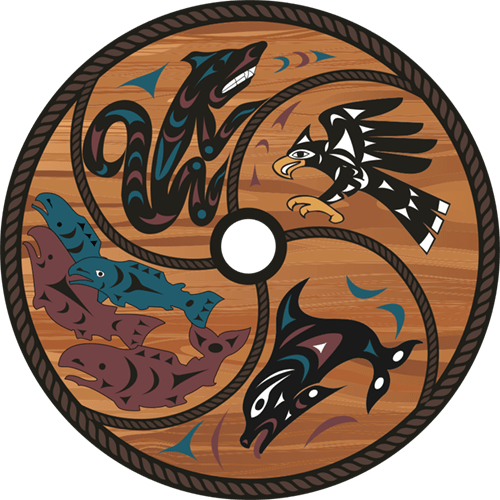Blueberry River First Nations’ Landmark Legal Victory Sets Strong Precedent for Protection of W̱SÁNEĆ Douglas Treaty Rights
The W̱SÁNEĆ Leadership Council (WLC) is exploring the application of the landmark legal victory by the Blueberry River First Nations (Blueberry) in Yahey v. British Columbia, 2021 BCSC 1287 (Yahey) to W̱SÁNEĆ Douglas Treaty rights. The findings of the Supreme Court of British Columbia in this recent decision lends support to the WLC in their mandate to promote the interests of the W̱SÁNEĆ First Nations by pursuing the protection of our treaty rights.

As controversial as they may be, the 1852 North and South Saanich Douglas Treaties, (also known as the Douglas Treaties), are considered the official written agreement between W̱SÁNEĆ people and the colonial government in Canada. The rights recognized in the Douglas Treaties, as recognized by Canadian courts, share similarities with Treaty 8 in northeastern BC, to which Blueberry is an adherent. Under Treaty 8, the Crown made a promise to the Dane-zaa people that they would maintain their rights to hunt, trap and fish over the lands as they had always done.
The continued ability of W̱SÁNEĆ people “to hunt over the unoccupied lands, and to carry on our fisheries as formerly” as promised in the Douglas Treaties is critical to upholding W̱SÁNEĆ ways of life, worldview, culture, and well-being.
Yet, uninterrupted access to hunt and fish is for many, a distant memory. W̱SÁNEĆ community members commonly face harassment and wrongful arrest for exercising their constitutionally protected rights, while obstacles to former and current hunting places range from fences to extraction, development and endless urban sprawl, which has obliterated access to and availability of traditional hunting areas. In addition, the mismanagement of wildlife, overfishing and marine pollution have contributed to the loss of W̱SÁNEĆ members’ ability to meaningfully exercise their rights.
These lived experiences are in direct opposition to the promises made in the Douglas Treaties. As such, the WLC is exploring ways to assert, revive and protect our Douglas Treaty rights.
The Court found that the cumulative impacts of development infringed Blueberry’s Treaty rights.
After experiencing significant adverse impacts on their ability to meaningfully exercise their rights, Blueberry commenced a claim to defend the rights guaranteed to them under Treaty 8. Treaty 8 states, in relevant part:
Her Majesty the Queen HEREBY AGREES with the said Indians that they shall have right to pursue their usual vocations of hunting, trapping and fishing throughout the tract surrendered as heretofore described, subject to such regulations as may from time to time be made by the Government of the country, acting under the authority of Her Majesty, and saving and excepting such tracts as may be required or taken up from time to time for settlement, mining, lumbering, trading or other purposes.
The Crown also made oral promises that the Indigenous signatories “would be as free to hunt and fish after the treaty as they would be if they never entered into it.”
Blueberry argued that that the Province had authorized industrial development within Blueberry’s Treaty 8 territory to such an extent that the cumulative impacts of such development have had significant adverse impacts on the meaningful exercise of Blueberry’s treaty rights, resulting in a breach of the Treaty and an infringement of their Treaty rights.
The Court’s decision in Yahey was the first to apply a legal test for determining whether cumulative impacts from provincial authorizations collectively amounted to an unjustified infringement of historic treaty rights. The Court applied a test for infringement by considering: “whether Blueberry’s treaty rights (in particular their ability to hunt, fish and trap within their territories) have been significantly or meaningfully diminished when viewed within the way of life from which they arise and are grounded.” [emphasis added].
Following a 160-day trial, the Court agreed with Blueberry and found that the Province was in breach of its obligations under Treaty 8 and had unjustifiably infringed Blueberry’s treaty rights. In granting the relief sought by Blueberry, the Court declared that the Province could no longer continue to authorize activities that unjustifiably infringed Blueberry’s treaty rights.
Although Blueberry’s success was dependent upon certain unique factors, the Yahey decision establishes a framework for other First Nations to raise similar claims of infringement of their treaty rights caused by cumulative impacts within their territory.
The Court recognized that rights infringement can occur in relation to portions of a First Nation’s territory.
Blueberry presented evidence establishing the locations in which its members have traditionally hunted, fished, and trapped, and provided evidence demonstrating the extent and impacts of industrial development – such as forestry and oil and gas development – on those areas. Blueberry showed evidence, for example, that Moose and Caribou populations on their territories declined as a result of “anthropogenic (human) disturbance, including industrial disturbance[.]”
The Court found “the extent of the lands taken up by the Province for industrial development (including the associated disturbances, impacts on wildlife, and impacts on Blueberry’s way of life), means there are no longer sufficient and appropriate lands in Blueberry’s territory to allow for the meaningful exercise by Blueberry of its treaty rights.”
The Court continued, “[t]he cumulative effects of industrial development authorized by the Province have significantly diminished the ability of Blueberry members to exercise their rights to hunt, fish and trap in their territory as part of their way of life and therefore constitute an infringement of their treaty rights.”
Importantly, the Court acknowledged that certain places to exercise harvesting rights have significant value and are not easily replaced, and that for the Crown, “[W]hen faced when faced with allegations that important or core areas within a nation’s traditional territory are being impacted or destroyed, it is no answer to say: go elsewhere, you have a large territory.” The Court stated that the Province could not deny any infringement by telling Blueberry that its “members can still exercise their rights in other outlying areas, which may or may not be shared with other First Nations, and which may or may not hold the same cultural, ecological or spiritual values.”
Rather, the Court recognized that First Nations are entitled to bring claims for infringement in relation to a portion of their territories that are affected by development and in which their rights have been impacted. Otherwise, this would disregard “a nation’s attachment to specific places, its patterns of use and occupation, its way of life, and the Indigenous laws and protocols that govern use of shared or neighbouring areas.”
Blueberry won the case and the Court ordered meaningful relief.
In the result, the Court held:
1. In causing and/or permitting the cumulative impacts of industrial development on Blueberry’s treaty rights, the Province has breached its obligation to Blueberry under Treaty 8, including its honourable and fiduciary obligations; and
2. The Province has taken up lands to such an extent that there are not sufficient and appropriate lands in the Blueberry Claim Area to allow for Blueberry’s meaningful exercise of their treaty rights, thereby unjustifiably infringing Blueberry’s treaty rights.
The Court granted the following relief:
3. The Province may not continue to authorize activities that breach the promises included in the Treaty, or that unjustifiably infringe Blueberry’s exercise of its treaty rights; and
4. The parties must act with diligence to consult and negotiate for the purpose of establishing timely enforceable mechanisms to assess and manage the cumulative impact of industrial development on Blueberry’s treaty rights.
The Court suspended declaration #3 for 6 months to allow the parties to negotiate changes to the regulatory regime that recognize and respect Blueberry’s treaty rights.
The Province did not appeal the decision. Blueberry and the Province reached an interim agreement in October 2021, which included the provision of funding to enable Blueberry to undertake activities to heal the land and to support Blueberry in protecting their Indigenous way of life. The Province stated in November 2022 that they are close to reaching a further agreement with Blueberry to find a new approach to natural resource development that protects Blueberry’s treaty rights and addresses cumulative impacts.
Implications for W̱SÁNEĆ
In Yahey, the Province’s haphazard industrial development over many years created mounting obstacles to Blueberry’s way of life. The Court found that “the tipping point has been reached”, whereby Blueberry’s treaty rights “have been significantly and meaningfully diminished when viewed within the way of life in which these rights are grounded.”
While there are strong similarities between Blueberry and W̱SÁNEĆ experiences, and this precedent-setting case offers some hope for the restoration of treaty rights, taking the Province to court is an arduous, expensive, and uncertain endeavour. Differences in treaty language and the circumstances under which each treaty was signed, as well as the unique impacts of development in each territory present the need for cautious optimism.
That being said, the outcome of the Yahey case provides an opportunity for the WLC to reflect on the meaning, infringement and implementation of the rights recognized and protected by the Douglas Treaties. The W̱SÁNEĆ community has experienced similar obstacles to maintaining the traditional way of life due to ongoing colonial extraction, urbanization and development and the resulting impacts on wildlife and ecosystems, and it is worth considering the similar infringements of W̱SÁNEĆ’s Douglas Treaty rights.
The WLC is working towards a future in which the hunting and fishing rights that are recognized and protected under the Douglas Treaties are fully realized, and in which the W̱SÁNEĆ people have sovereignty over their own land management practices and can access hunting territories without settler restrictions.
To help make this future a reality, WLC encourages W̱SÁNEĆ community members to participate in collaborative efforts to achieve understanding, recognition and enforcement of the rights protected by the Douglas Treaties. Stay tuned for details!










